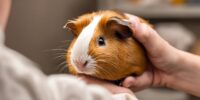How to Introduce New Foods to Chinchillas: Dietary Considerations
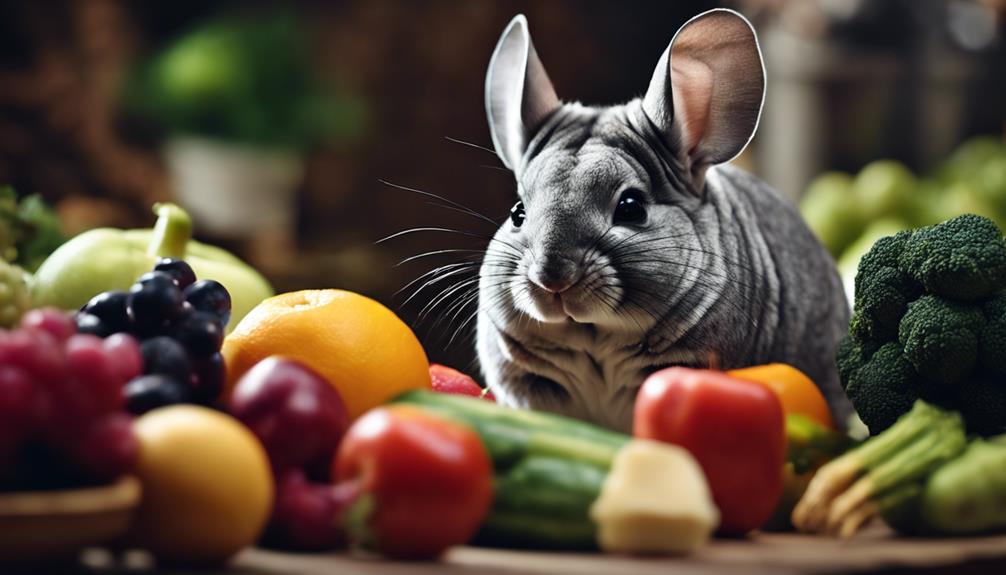
Introducing new foods to chinchillas should be done gradually to prevent digestive upset. Start by offering small amounts of the new food and observe how your chinchilla reacts. It is important to pay attention to any signs of discomfort or changes in their stool. If your chinchilla tolerates the new food well, you can slowly increase the amount over time.
Chinchillas have sensitive digestive systems, so it is essential to introduce new foods one at a time. This will help you identify any potential allergies or intolerances. Some safe options for new foods include fresh hay, vegetables like carrots or bell peppers, and a limited amount of fruits like apples or grapes. Always research a new food item before offering it to your chinchilla to ensure it is safe for them to eat.
Remember that chinchillas have specific dietary requirements, and their diet should primarily consist of hay and a small amount of pellets. Treats should be given sparingly to prevent obesity and other health issues. By introducing new foods slowly and monitoring your chinchilla's reaction, you can provide them with a varied and balanced diet while keeping them healthy and happy.
Chinchilla Diet Basics
Introducing new foods to chinchillas requires a gradual approach to prevent digestive upsets and ensure optimal nutrition. When considering chinchilla diet basics, it's crucial to focus on food variety and a balanced diet. Chinchillas thrive on a mix of high-quality pellets, fresh hay, and occasional treats like fresh fruits and vegetables.
Portion control is essential to prevent obesity and other health issues. Chinchillas should be fed in small amounts twice a day to mimic their natural grazing behavior. Monitoring their food intake is vital to prevent selective eating, where chinchillas pick out only their favorite parts of the diet, leading to nutritional imbalances.
Establishing a feeding schedule is also key. Consistency in feeding times helps maintain their digestive health and prevents overeating. Water should always be available in a sipper bottle to keep chinchillas hydrated. By prioritizing food variety, balanced diet, portion control, and a consistent feeding schedule, chinchilla owners can ensure the overall well-being of their furry companions.
Understanding Nutritional Needs
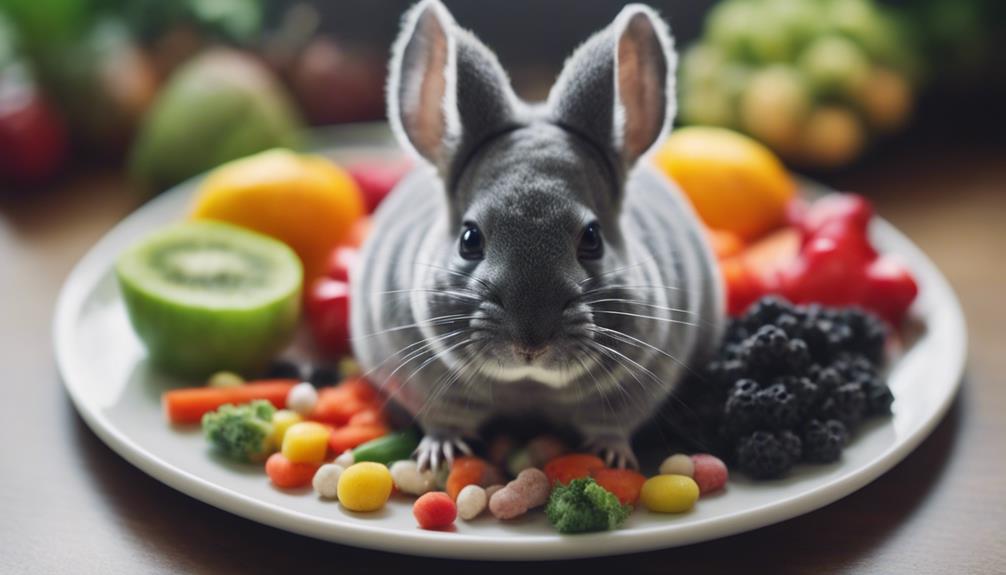
To ensure optimal health and well-being for chinchillas, understanding their specific nutritional requirements is essential. Chinchillas are herbivores with a diet primarily consisting of high-fiber hay, such as timothy hay. However, they also require certain supplements to meet their nutritional needs. Calcium supplements are crucial for chinchillas to prevent dental issues and maintain healthy bones. It's important to consult with a veterinarian to determine the appropriate type and dosage of supplements for your chinchilla.
When it comes to protein sources, chinchillas should be provided with high-quality hay and pellets that contain a sufficient amount of protein. Legume hay, such as alfalfa hay, can be a good protein source but should be given in moderation due to its high calcium content. Additionally, offering small amounts of fresh vegetables and fruits can provide additional nutrients and variety to the chinchilla's diet.
Understanding supplements and protein sources is vital in ensuring that chinchillas receive a well-balanced diet that supports their overall health and longevity.
Gradual Food Introductions
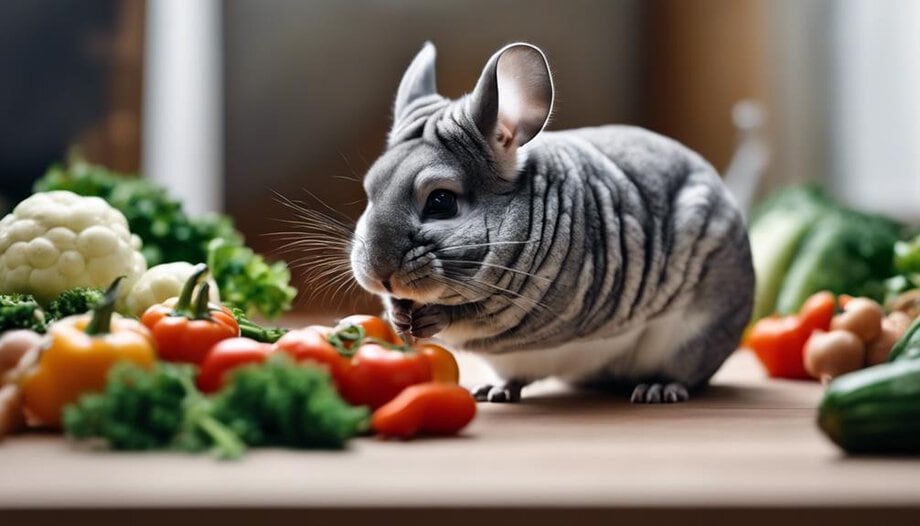
Gradually introducing new foods to a chinchilla's diet is essential to prevent digestive upset and ensure acceptance of novel items. A slow introduction allows the chinchilla's digestive system to adjust gradually to the new food, reducing the likelihood of gastrointestinal disturbances.
When incorporating new items into the chinchilla's diet, a gentle transition is key to promoting acceptance and minimizing the risk of aversion. Abrupt changes can lead to digestive issues such as diarrhea, bloating, and discomfort. By introducing new foods slowly and in small quantities, chinchilla owners can monitor their pets for any adverse reactions and adjust the diet accordingly.
This approach helps chinchillas adapt to a varied diet while maintaining their digestive health. Overall, a methodical and gradual introduction of new foods is crucial for ensuring the well-being and acceptance of dietary changes in chinchillas.
Monitoring Digestive Health
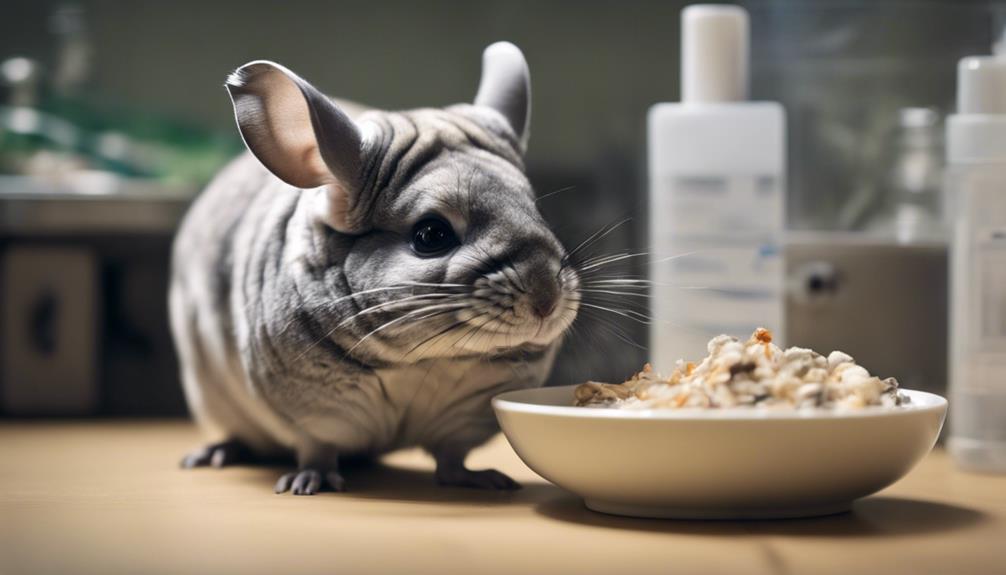
How can chinchilla owners effectively assess and maintain the digestive health of their pets? Ensuring optimal gut health and digestive balance is crucial for the overall well-being of chinchillas. Here are some key points to consider:
- Monitor Stool Consistency: Regularly check the consistency of your chinchilla's stools. Ideally, they should be firm, dry, and cylindrical. Any sudden changes in stool consistency may indicate digestive issues.
- Observe Eating Habits: Pay attention to your chinchilla's appetite and eating habits. A sudden loss of appetite or a decrease in food consumption could signal an underlying digestive problem.
- Provide Adequate Hay: High-quality hay is essential for maintaining digestive health in chinchillas. Make sure your pet has a constant supply of fresh hay to support proper gut function.
- Offer Fresh Water: Hydration is key to digestive balance. Ensure your chinchilla has access to clean, fresh water at all times to aid in digestion and prevent issues like constipation.
Safe and Unsafe Foods
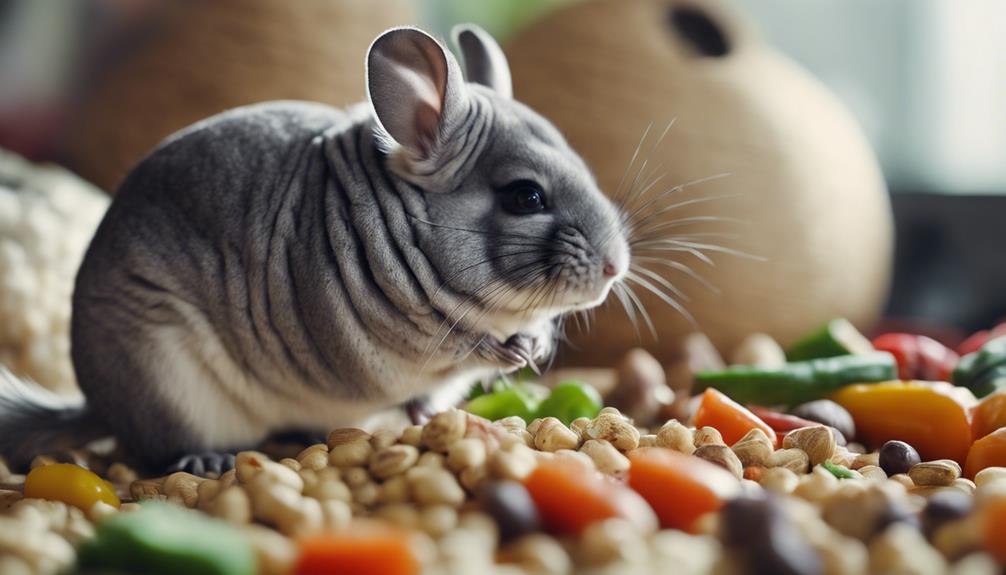
When considering the dietary needs of chinchillas, it's important to distinguish between foods that are safe and those that may pose risks to their digestive health. Food safety is paramount in maintaining the well-being of these small mammals. Chinchillas thrive on a diet that's high in fiber and low in fat, making hay the cornerstone of their nutrition. Fresh hay, such as timothy hay, provides essential fiber for proper digestion and dental health. Pellets specifically formulated for chinchillas offer a balanced mix of nutrients, but it's crucial to check the ingredient list to ensure they meet dietary balance requirements.
On the other hand, certain foods can be harmful to chinchillas. High-fat treats, sugary snacks, and human foods should be strictly avoided as they can lead to digestive upset and obesity. Foods like chocolate, avocado, and foods high in sugar or salt are toxic to chinchillas and should never be fed to them. Maintaining a diet focused on food safety and dietary balance is key to ensuring the health and longevity of chinchillas.
Treats and Occasional Foods
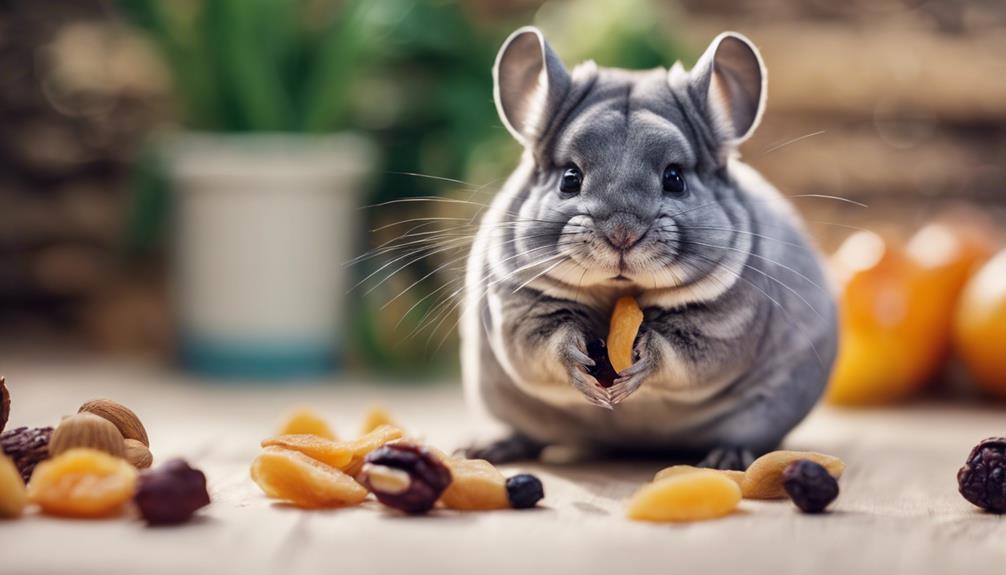
Chinchillas benefit from occasional treats in their diet, but these should be chosen carefully to maintain their health. Healthy treat options like small pieces of fruits or vegetables can be a good choice.
However, moderation is key to prevent potential health issues and maintain a balanced diet for these small pets.
Healthy Treat Options
Selecting nutritious treats like dried herbs and high-fiber fruits can be beneficial for chinchillas when introducing new foods. When considering healthy treat options, chinchilla owners should focus on providing a variety of fruits and vegetables that are safe for these small pets.
Here are some recommended options:
- Dried rose hips
- Blueberries
- Dried apple slices
- Sweet bell peppers
These treats not only offer essential nutrients but also add variety to the chinchilla's diet. It's crucial to introduce new treats gradually and monitor the chinchilla's response to ensure they tolerate the new foods well. By offering a mix of fruits and vegetables, chinchilla owners can enhance their pets' diet while keeping them healthy and happy.
Moderation Is Key
To maintain optimal health for chinchillas, it is essential to carefully regulate the intake of treats and occasional foods. Portion control and balance are crucial to prevent health issues such as obesity and digestive problems. Slowly transitioning chinchillas to new treats is key in avoiding gastrointestinal upsets. Offering a variety of treats ensures that chinchillas receive different nutrients and prevents dietary imbalances. Here is a table showcasing some treats that can be given occasionally to chinchillas:
| Treat Options | Frequency |
|---|---|
| Dried Herbs | Once a week |
| Rose Hips | Twice a month |
| Raisins | Once a month |
| Oats | Once a week |
| Cheerios | Twice a month |
Consulting a Veterinarian
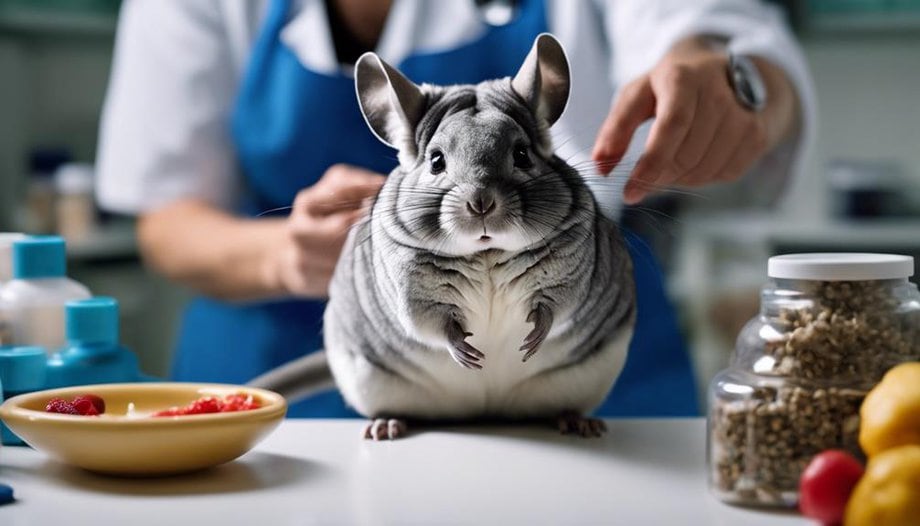
Before introducing new foods to chinchillas, it's advisable to consult with a qualified veterinarian specializing in exotic pets. A veterinarian can provide essential guidance on the nutritional needs of chinchillas and ensure that any new foods introduced align with their dietary requirements. Here are some reasons why consulting a veterinarian is crucial:
- Nutritional Guidance: Veterinarians can offer expert advice on the specific nutritional needs of chinchillas, helping you select foods that will enhance their health and well-being.
- Wellness Checkups: Regular wellness checkups are essential to monitor your chinchilla's overall health and catch any potential issues early on.
- Allergy or Sensitivity Screening: Some chinchillas may have allergies or sensitivities to certain foods. A veterinarian can help identify and avoid these triggers.
- Preventive Care: Veterinarians can provide preventive care recommendations to keep your chinchilla healthy and prevent common health problems associated with diet.
Consulting a veterinarian ensures that you're making informed decisions about your chinchilla's diet and overall health.
Frequently Asked Questions
Can Chinchillas Eat Nuts and Seeds as a Part of Their Regular Diet?
In balancing a chinchilla's diet, nuts and seeds can be given, but with caution. Portion control is key. Training and consistency in feeding ensure nutritional balance. Remember, moderation is like a sprinkle of joy in their mealtime routine.
Are There Any Specific Fruits or Vegetables That Are Particularly Beneficial for Chinchillas?
Chinchillas benefit from a variety of fruits and vegetables, like apples, carrots, and leafy greens, offering essential nutrients. Preferences vary, so introducing small amounts gradually is key. Ensure safe options, maintain a feeding schedule for a balanced diet.
How Can I Tell if My Chinchilla Is Experiencing Digestive Issues Related to Introducing New Foods?
To monitor digestive health in chinchillas, observe for symptoms like diarrhea, bloating, or decreased appetite. If these issues arise during dietary adjustments, prevention measures include slowly introducing new foods, ensuring they are chinchilla-safe.
Are There Any Common Food Allergies or Sensitivities That Chinchillas May Have?
Chinchillas may have sensitivities, dietary restrictions, food intolerances, or common allergies. It's crucial to monitor their reactions when introducing new foods. Remember, just like people, chinchillas can also have specific food preferences and aversions.
Are There Any Supplements That Are Recommended for Chinchillas to Ensure They Are Getting All Necessary Nutrients in Their Diet?
Supplement recommendations for chinchillas are crucial to meeting their nutritional needs. Providing essential vitamins like Vitamin C and minerals such as calcium can help maintain their health. Consult with a vet for specific guidance.





